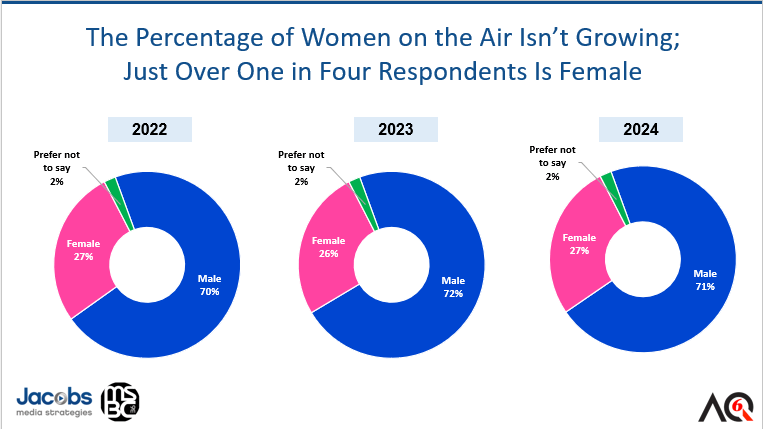
The more things change….
For women on the air in radio in 2024, conditions on the ground may have the appearance of improvement. But if you ask women – whether it’s the 10th year summary from McKinsey’s “Women in the Workplace” or the sixth in our AQ study of on-air talent in radio – they’ll tell you it is still very much a challenge. In fact, many report the situation has not improved.
This amazing report landed on my desk a couple weeks back, and I’ve been reading it in pieces. Finally over the weekend, I had a chance to sit down with it. And while it speaks to a larger America than our small insular world of radio broadcasting, the similarities and themes grabbed me. Let me share some of those thoughts with you.
 First, this McKinsey report is the 10th annual published in this series. The numbers are impressive. During the past decade, McKinsey and their partner, LeanIn.Org, have brought more than 1,000 companies into the study, surveying north of 480,000 people. The theme is about workplace experiences, so the survey this year includes more than 15,000 employees and 280 HR leaders.
First, this McKinsey report is the 10th annual published in this series. The numbers are impressive. During the past decade, McKinsey and their partner, LeanIn.Org, have brought more than 1,000 companies into the study, surveying north of 480,000 people. The theme is about workplace experiences, so the survey this year includes more than 15,000 employees and 280 HR leaders.
The report acknowledges “real progress” for women. But its authors admit that for particularly women of color, these gains are fragile.
To that end, “Women in the Workplace 2024” makes three key conclusions:
- Companies, in fact, have taken action that has resulted in progress for women on the job.
- “Change is hard and messy” – their words – and there needs to be more done to “fix the pipeline” and improve workplace culture.
- As noted, progress is fragile, and maybe not as impressive or lasting as it might appear.
And this line jumped out at me, because in many ways, it sums up what we saw in our recent AQ6 study of commercial radio air talent:

Just as we see in radio, when women aren’t getting hired for entry level jobs, the underrepresentation begins. They are slower to get into management jobs for just this reason. In fact, everything slows from promotions to their ability to hire their own staffers.
Once again in AQ6, we see the same basic proportions of women on the air we’ve tallied since these studies were launched. And during the turbulence of the last three years in radio, in particular, you’re hard-pressed to see progress in these numbers:

It is hard to feel good about this chart, and I mince no words when I present the study to conferences, station groups, and company meetings.
But while perusing the McKinsey report, I ran across this chart, which essentially blares the same disheartening results:

The headline above that chart tells you all you need to know. And looking at the percentage of women in each job category isn’t exactly reassuring if you’re a woman plotting out your career strategy. As the report indicates, progress has been made, but it’s fleeting and very likely dependent on the economy not entering into another recession (which, of course, at some point it will).
 One last key point. The McKinsey study talks about many big initiatives in America’s companies that can be important determinants for changing hearts, minds, and the business world itself. But there are also the small, subtle moves that can undermine change. The study’s authors call them “microaggressions” – defined as “comments and actions that undermine women’s credibility and leadership skills.”
One last key point. The McKinsey study talks about many big initiatives in America’s companies that can be important determinants for changing hearts, minds, and the business world itself. But there are also the small, subtle moves that can undermine change. The study’s authors call them “microaggressions” – defined as “comments and actions that undermine women’s credibility and leadership skills.”
According to the new report, these small but obvious moments of bias and passive aggressiveness are being reported at the same level as they were five years ago. Interestingly however, men aren’t anywhere even close when it comes to picking up on these same insidious moves and statements.
And that took me back to the gender gap we see every year in our AQ studies. The telling agree/disagree statement sets up how men and women see the same situations differently:
“Women have as good a chance as men to advance in the air studio.”
The results very much match what the McKinsey report would have us believe about how gender shades one views about these types of fundamental issues and biases:

In fact, they suggest the radio broadcasting industry is even more ambivalent to the obvious forces at work felt by women on the job in radio, trying to get ahead.
I’ve had this conversation with women in our industry many times in recent years. As we all well know, most program directors got their starts in the air studio. So, getting that first on-air job and having the chance to move up at that station (or others) is the key to eventually becoming that PD or brand manager. Once in that chair, female programmers have the chance to call at least some of the shots about who else is on staff.
But when those on-air jobs are slow to come by and/or when women feel trapped in their positions in the hierarchy, we end up with numbers like you see above.
And I know that many of you are likely thinking that today’s airstaffs have been so decimated by RIFs and cutbacks that even the idea of hiring others to join the team has become all but impossible.
and cutbacks that even the idea of hiring others to join the team has become all but impossible.
The task of enlightening those at the station level is up to the companies operating radio stations, whether they are mom & pop owners or denizens of the C-suites in the industry’s biggest companies.
The data doesn’t lie – whether it’s McKinsey’s or Jacobs Media’s. Many men don’t get it, and until we do, we’re going to keep shaking our heads at annual reports like “Women in the Workplace” and AQ.
 I certainly fell into that group before I started doing these air personality research studies with Don Anthony and Morning Show Boot Camp. Yes, I had a basic understanding of imbalances, but like many men in virtually every workforce, I took my own advantage for granted, and certainly didn’t always consider its implications on others.
I certainly fell into that group before I started doing these air personality research studies with Don Anthony and Morning Show Boot Camp. Yes, I had a basic understanding of imbalances, but like many men in virtually every workforce, I took my own advantage for granted, and certainly didn’t always consider its implications on others.
You could never call me Mr. Enlightened today, but my eyes are wide open and I am clearly more attuned to and cognizant of the state of play in radio – and in the larger work environment. It also helps to have a daughter hacking her way through the labyrhith of the working world (and now a granddaughter who will be looking for a job around the time when McKinsey publishes their 30th study and – gasp! – if there’s an AQ26).
Meantime, I’m confident Morning Show Boot Camp will continue to draw attention to the plight of women on the air as they have the past three decades with the Women’s Forum. MSBC36 this past summer in San Diego featured the first every “Women’s Brunch” (pictured below), an extremely well-attended even hosted by Local Media San Diego all-star Corey Dylan (upper right in the monatage). A number of female talent have made this their cause – and it’s an important one:


L-R: Delilah, Corinne Baldassano
Helping women navigate the morass that radio can be is also the mission of MIW – or Mentoring and Inspiring Women in Radio. Their charge is to take a leadership role, bringing attention to women on the airwaves, on the salesforce, in the corner office, and yes, in the programming department.
Notably this year, syndicated star and icon, Delilah, received the organization’s “Airblazer” award, while a former colleague of mine dating back to our days with ABC Radio, Corinne Baldassano, took MIW “Trailblazer” honors.
 Some of my favorite
Some of my favorite women people in the business serve on the board of MIW. And they do great work, making it possible for “mentees” to network and connect with pros in the business.
They’ve also done their homework, producing Gender Analysis Studies for radio. The 2022 version is posted on their website, revealing a paltry number that’s germane to this conversation. Only about 12% of radio programmers in the U.S. are women, essentially the same percentage as the previous year.
That’s about half the percentage of on-air talent we tally in our AQ studies, illustrating once again just how far back radio broadcasting ranks as an industry attractive to females entering the workforce.
So, let’s hope McKinsey’s next study shows actual progress. And that MIW will continue its good work on behalf of all broadcasters.
Radio cannot be a healthy industry if this imbalance isn’t soon recognized and ultimately rectified.
Originally published by Jacobs Media








